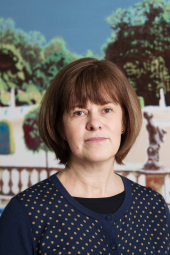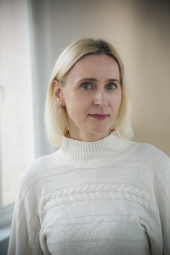The 2nd Department of the Psychiatry Clinic – the non-psychotic crises department – primarily treats patients with depressive and anxiety disorders whose emotional state has occasioned the need for emergency hospitalization and, in extreme cases, even suicidal thoughts. We also try to aid patients with eating disorders in the purview of the Psychiatric Hospital’s general department if their condition does not require or who are not ready to be assigned to a specialized department.
Many of our team members have been working together for over ten years, ever since the department was opened; or they joined our department in the early years – this has helped to foster a general understanding of how to support patients who come for treatment. The department is staffed by psychiatrists, psychologists, an occupational therapist, nurses and caregivers.
A comprehensive approach to treatment
Alongside psychiatric diagnosis and psychological testing, essential physical health screenings are performed for people who come for treatment, and in unusual cases, other specialists in the field are consulted, and patients are referred to imaging. Such a comprehensive approach provides an opportunity for better treatment decisions.
Two nurses are on everyday duty as attending nurses. Consistent close contact is the basis for trust to emerge and allows flexible responses to the situation, such as the involvement of a social worker where necessary. The attending nurses work closely with the patient’s attending physician and occupational therapist.
The occupational therapist engages in group therapy. Trained in music and art therapy practices, the therapist teaches relaxation exercises and where indicated, a vibroacoustic bed. Of the staff in the department, it is often the occupational therapist who develops a particularly close rapport with the patient.
Individual psychotherapy
The psychologists in our department focus on individual psychotherapy and the diagnostics prescribed by the physician. The psychologists in our department are trained in methods for treating post-traumatic stress and various fields of psychotherapy. If necessary, the patient's family members are provided counselling in family therapy sessions.
We see our function as working as a united team, consisting of a doctor, attending nurse and psychologist, and we also take into account the observations of other specialists, attending nursing and night-duty nurses. During the treatment, weekly meetings are held with the patient where all matters pertaining to hospital care can be discussed.
Patients are referred to our department usually from either a psychiatric polyclicnic physician or hospital reception department. In the past, people have also been on waiting lists for treatment in our department. The treatment period is generally up to three weeks, but based on the patient’s condition and status, we try to be flexible. Upon leaving, patients are given recommendations for further treatment. We try to be there for patients in an efficient, balanced manner, as a well-functioning, friendly team.



